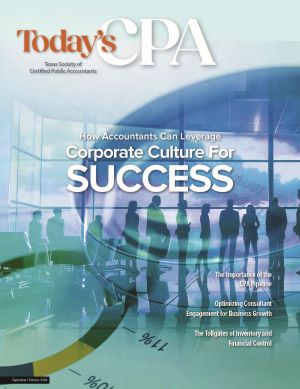September 01, 2024
How Accountants Can Leverage Corporate Culture for Success
By Frank Badua, Ph.D., MBA, CIA, and Ashish Ghimire, Ph.D.
High-profile accounting scandals have grabbed headlines over the years, sparking extensive reforms to curb accounting fraud and corporate misconduct. The most infamous of these scandals often showcased toxic corporate cultures as a significant factor (Amato, 2012), prompting regulators to place greater emphasis on fostering ethical cultures and strong "tone at the top" leadership.
For example, the Committee of Sponsoring Organizations (COSO) internal control framework explicitly references “corporate environment” or “internal environment” (Leland 2023; Kong, Latry, Bah, and Biswas, 2018), which comprise the corporate culture influencing and permeating its controls and operations (Deloitte, 2004). Similarly, the UK’s Financial Reporting Council references “corporate culture/culture” 55 times in its Review of Corporate Governance Reporting white paper (FRC, 2022).
The effects of bad corporate cultures are well known, while the positive effects arising from good corporate culture receive less attention in the press. Examples of both are included in Table 1.
Table 1. | |
Bad Corporate Culture | Good Corporate Culture |
Toshiba's corporate culture emphasized blind obedience to superiors, discouraging whistleblowing. Toshiba was delisted from the Tokyo Stock Exchange in 2023 due to financial fraud scandals. | Though the larger corporate culture at WorldCom was bad, within the internal audit division, the culture was described by its head, whistleblower Cynthia Cooper, as one of "honesty, transparency … stepping up to the plate and swinging the bat to do what you needed to." Cooper and her team helped unravel the WorldCom fraud. |
Enron's corporate culture was notoriously toxic, incentivizing employees to achieve financial targets at any cost. Ultimately, accounting fraud led to the company's demise. | In testimony that uncovered the Lockheed bribery scandal, William Finley of the CPA firm Arthur Young shared the following with Sen. Charles Percy about his firm's corporate culture. Sen. Percy: "Would it be looked upon as over-moralizing if you advise a client with respect to ethics?" Finley said, "If we are troubled by the conduct of the business, our obligation is to bring it to attention." |
However, the concept of corporate culture appears to not have been operationalized and is rarely mentioned in accounting and audit standards. As a result, accountants lack guidance on how to measure or use it.
A written code of ethical culture does not guarantee good corporate conduct (Contreras, Dey, and Hill, 2020). Is there a better way to capture and measure corporate culture? Scholarly literature from the accounting and finance profession suggests various ways.
There have been various scholarly papers using measures of corporate culture to analyze issues of accounting and auditing relevance. These measures vary from those based on firm activities, manager characteristics or geographic location.
The following table provides more details on the articles published and their findings.
Measure of Corporate Culture | Article | Findings |
Corporate culture measured by level of corporate social responsibility activity such as environmental, social equity and governance initiatives | Lins, Servaes, Tamayo (2017), "Social Capital, Trust and Firm Performance: | Firms with greater levels of social capital have higher stock returns |
Corporate culture measured by management value orientation (ex. innovation, outcome orientation, attention to detail, team orientation, respect for people, and stability) | Le, Nguyen, and Hoang (2020), "Organizational culture, management accounting information, innovation capability and firm performance," Cogent Business and Management | Firms with greater levels of social capital innovate more and better design and use their management accounting information system |
Corporate culture measured by organizational attributes (ex. attitude about uncertainty, perceived competition level, supportiveness, rule-based orientation, formality, and centralization) | Erserim, A (2012),"The Impacts of Organizational Culture, Firm's Characteristics and External Environment of Firms on Management Accounting Practices," Procedia Social and Behavioral Sciences | Firms with greater levels of social capital practice better budgeting, waste reduction, and resource use |
Corporate culture measured by social capital score in U.S. county where firm has its HQ. This score measures community co-operative norms and pro-social actions. The measure is based on information about county level voter turnout, census response rates, total number of social organizations and total number of nonprofit organizations, and is maintained by the Northeast Regional Center for Rural Development (NRCRD) at the Pennsylvania State University. | Gao, Li, and Lu (2019), "Social capital and managers’ use of corporate resources," Journal of Business Ethics Hilary and Hui (2009), "Does religion matter in corporate decision making in America?" Journal of Financial Economics | Firms with greater levels of social capital use corporate resources more efficiently Firms with greater levels of social capital have less corporate tax avoidance and unethical corporate practices |
One measure of corporate culture is corporate social responsibility (CSR) or philanthropic activity by the firm. Another measure of corporate culture is its environmental and organizational characteristics, which include:
- Attitude about uncertainty;
- Perceived competition level;
- Supportiveness;
- Centralization;
- Formality; and
- Rule-based orientation.
Another measure of corporate culture focuses not on the firm but on its personnel, namely, management. Management value orientation identifies what managers consider to be paramount and might value the most in planning and executing their activities, including:
- Innovation;
- Outcome orientation;
- Attention to detail;
- Team orientation;
- Stability; and
- Respect for people.
However, the measure of corporate culture that was employed the most often is based on the location of the firm’s headquarters. A significant stream of literature in accounting, finance and other business disciplines has begun to use a measure of social capital in geographical areas to proxy for corporate culture.
The notion of social capital as used in this article was coined by urban planner Jane Jacobs (Alexiou, 2006), who used it to describe the informal apparatus of “self-government … forged by neighborhood networks” (Jacobs, 1961, p.183).
Over time, various disciplines have developed unique methods to measure social capital, aiming to better explain and predict various phenomena. In the realms of accounting and finance, scholars have crafted a distinct measure of social capital, one that considers the intricate social structures within a community that promote cooperative norms and pro-social actions.
The data is based on information about county level voter turnout, census response rates, total number of social organizations and total number of nonprofit organizations. The Northeast Regional Center for Rural Development (NRCRD) at the Pennsylvania State University updates this social capital for all U.S. counties annually.
Having explored various metrics for evaluating corporate culture, this article shifts focus to their practical relevance for accounting and auditing. It examines how these cultural indicators can enhance the roles of financial report preparers, auditors and managerial accountants. Additionally, it provides a detailed look at how matching corporate culture metrics with accounting and audit functions can optimize performance and ensure financial integrity.
For financial statement and annual report preparers, one of the key takeaways is that investors place high value on indications of a strong corporate culture. Research shows that firms whose CSR or philanthropic activity exhibits good corporate culture trade at a premium to others. This suggests that preparers of financial statements would do well to include and highlight CSR performance, though it is not currently mandatory in the United States.
For auditors, it's important to note that higher levels of corporate culture are associated with lower incidences of corporate tax avoidance, financial reporting irregularities and corporate misconduct. These findings are from research where social capital was used as a proxy for corporate culture. Thus, in planning audits, auditors might use client locale as a factor to consider when evaluating inherent risk.
Interestingly, research also reveals that strong corporate culture, as indicated by social capital within a specific geographic region, correlates with lower audit fees.
Therefore, it appears that using corporate culture indicators as part of an audit planning tool is acceptable. Auditors employing this approach would not be vulnerable to accusations of unfair profiling of audit clients analogous to racial profiling, which can lead to excessively harsh police tactics and varying rates of IRS audits (Elzayn et al., 2023), especially if this practice is already being used for audit pricing decisions.
Finally, for managerial accountants, research reveals that corporate culture as measured by organizational traits and manager value orientation are associated with better design and use of managerial accounting information systems. A higher level of corporate culture, as captured by social capital, is associated with more efficient use of corporate resources, as well as lower costs of debt capital.
Research shows that there are different ways accountants can measure corporate culture, from firm activities to manager characteristics to geographic location. Perhaps more importantly, the same scholarship shows how these measures indicate how well a firm does in its operational, financial reporting and compliance objectives. Now it’s up to accountants and auditors to make intelligent use of them.
The Importance of Corporate Culture
Corporate culture is crucial for attracting and retaining top talent, particularly for new graduates who prioritize the following key factors.
Work Environment: Graduates seek supportive, inclusive workplaces where they feel valued and comfortable.
Career Development: Graduates look for employers who invest in employee growth through training, mentorship and clear advancement opportunities.
Job Satisfaction: Positive cultures lead to higher job satisfaction, making employees eager to join and stay with happy, engaged teams.
Work-Life Balance: Flexibility and remote work options are highly valued, reflecting a commitment to work-life balance.
Reputation: A strong corporate reputation enhances resumes and future career prospects, making reputable companies more attractive.
Employee Well-being: A focus on health and wellness, including mental health support, is important for those seeking employers who prioritize their overall well-being.
Values Alignment: Graduates look for employers with values that align with their own, including ethical practices and a commitment to diversity.
Innovation and Creativity: Companies that encourage new ideas and dynamic work environments appeal to graduates looking to make meaningful contributions.
Networking and Relationships: Graduates value environments that foster strong professional relationships and networking opportunities.

About the Authors:
Frank Badua, Ph.D., MBA, CIA, is Professor of Accounting at McMurry University Johnson School of Business in Abilene, TX. His previous articles have been published in over a half-dozen peer-reviewed journals, including Today’s CPA. He received his Ph.D. from Rutgers, the State University of NJ.
Ashish Ghimire, Ph.D., is Assistant Professor of Finance at McMurry University Johnson School of Business in Abilene, TX. He received his Ph.D. from the University of North Texas.

Bibliography
Alexiou, A. (2006) Jane Jacobs: Urban Vision. Rutgers U. Press: New Brunswick, NJ. 231.
Amato, N. (2012) “Lawmakers Reflect on SOX’s on Corporate Culture.” Journal of Accountancy. July.
AICPA (2012, December 15). Consideration of Fraud in a Financial Statement. AU-C-240.
Audit Board. “Agents of Change,” https://www.auditboard.com/blog/agents-of-change-cynthia-cooper-part-1/
Contreras, A., Dey, A., and Hill, C. (2020) “Tone at the Top and the Communication of Corporate Values: Lost in Translation?” Seattle Law Review. 43: 497.
Deloitte. Corporate Culture and Control Environment: Foundation of Internal Control. 2004
Elzayn, H., Smith, E., Hertz, T., Ramesh, A., Goldin, J., Fisher, R., and Ho, D. (2023) “Measuring and Mitigating Racial Disparities in Tax Audits,” Stanford Institute for Economic Policy Research.
Erserim, A. (2012) “The Impacts of Organizational Culture, Firm's Characteristics and External Environment of Firms on Management Accounting Practices” Procedia Social and Behavioral Sciences 62: 372-376.
Financial Reporting Council (FRC). Review of Corporate Governance Reporting. 2022.
Gao, Z., L. Li, and L. Y. Lu. 2019. Social capital and managers’ use of corporate resources. Journal of Business Ethics pp. 1–21.
Hasan, I., C.-K. HOI, Q. Wu, and H. Zhang. 2017a. Does social capital matter in corporate decisions? Evidence from corporate tax avoidance. Journal of Accounting Research 55:629–668.
Hasan, I., C. K. Hoi, Q. Wu, and H. Zhang. 2017b. Social capital and debt contracting: Evidence from bank loans and public bonds. Journal of Financial and Quantitative Analysis 52:1017–1047.
Hilary, G., and K. W. Hui. 2009. Does religion matter in corporate decision making in America? Journal of financial economics 93:455–473.
Institute of Chartered Accountants of England and Wales. (ICAEW). The Challenge of Auditing Culture. 2023.
Jacobs, J. 1961. 1 961, The Death and Life of Great American Cities. New York: Vintage.
Jha, A., and Y. Chen. 2015. Audit fees and social capital. The Accounting Review 90:611–639.
Kong, Y., Lartey, P., Bah, F., Biswas, N. (2018), “The Value of Public Sector Risk Management: An Empirical Assessment of Ghana,” Administrative Sciences. 8(30).
Le, H., Nguyen, T., and Hoang, T. (2020) “Organizational culture, management accounting information, innovation capability and firm performance,” Cogent Business and Management. 7(1).
Leland, A. (2023) “Fundamentals of the COSO Framework, Building Blocks of Internal Control” Auditboard, May.
Lins, K, Servaes, H., and Tamayo, A. (2017) “Social Capital, Trust, and Firm Performance: The Value of Corporate Social Responsibility during the Financial Crisis” Journal of Finance 72(4)
Parsons, C. A., J. Sulaeman, and S. Titman. 2018. The geography of financial misconduct. The Journal of Finance 73:2087–2137.
PCAOB (2024, December 15). Consideration of Fraud in a Financial Statement Audit. (AS 2401)
Strategic Finance Magazine, “Toshiba’s Toxic Culture,” https://www.sfmagazine.com/articles/2015/october/toshiba%E2%80%99s-toxic-culture
U.S. Senate (1970). Meeting of the Subcommittee on Multinational Corporations, Committee on Foreign Relations. 94th Congress
Thanks to the Sponsors of Today's CPA Magazine
This content was made possible by the sponsors of this issue of Today's CPA Magazine:






















